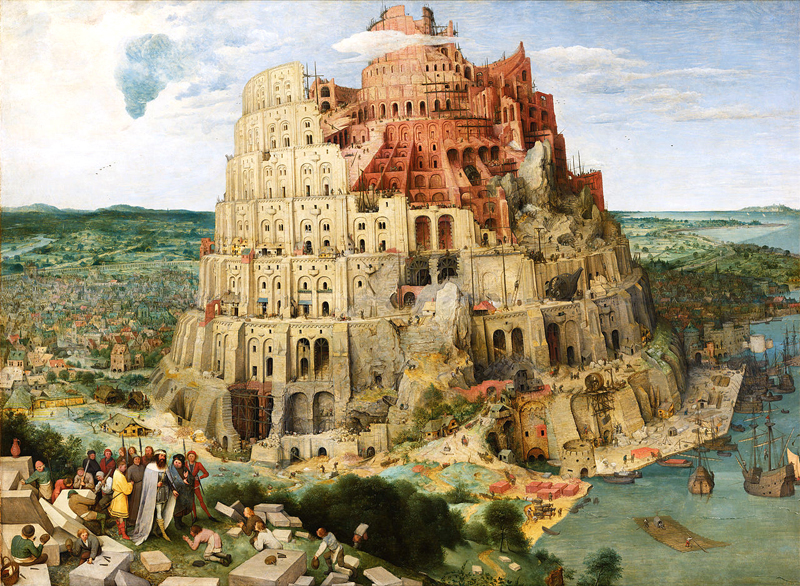
Tower of Babel
Pieter Bruegel, 1563
My dear friends,
Today is a significant day, the day of Pentecost, a day of reflection and connection. It is essential for us to understand the importance of communication and unity in our lives. In the Buddhist tradition, right speech and skillful action are fundamental principles that guide our interactions with the world. Bodhicitta, the awakened mind, embodies compassion and wisdom, qualities necessary for our spiritual growth and the well-being of others. As we go through the selected scriptures, let's contemplate on these principles and how they can be applied in our daily lives.
And as they migrated from the east, they came upon a plain in the land of Shinar and settled there.
And they said to one another, "Come, let us make bricks, and burn them thoroughly."
And they had brick for stone, and bitumen for mortar.
Then they said, "Come, let us build ourselves a city,
and a tower with its top in the heavens, and let us make a name for ourselves;
otherwise we shall be scattered abroad upon the face of the whole earth."
The LORD came down to see the city and the tower, which mortals had built.
And the LORD said, "Look, they are one people, and they have all one language;
and this is only the beginning of what they will do;
nothing that they propose to do will now be impossible for them.
Come, let us go down, and confuse their language there,
so that they will not understand one another's speech."
So the LORD scattered them abroad from there over the face of all the earth,
and they left off building the city.
Therefore it was called Babel(*), because there the LORD confused the language of all the earth;
and from there the LORD scattered them abroad over the face of all the earth.
- Genesis 11:1-9
The story of Babel is a powerful reminder of the importance of right speech and skillful action. The people of Babel, united by a single language and purpose, attempted to build a tower to the heavens. Their desire to make a name for themselves and avoid being scattered reflected a self-centered attitude, which ultimately led to their division and dispersion. In Buddhism, we are encouraged to cultivate Bodhicitta, the awakened mind that seeks enlightenment for the benefit of all beings. This story illustrates the consequences of self-centered actions and the importance of working together with a compassionate and selfless attitude.
So they [the Levites] read from the book, from the law of God, with interpretation.
They gave the sense, so that the people understood the reading.
- Nehemiah 8:5,8
Ezra's reading and the Levites' interpretation of the law helped the people understand its meaning and implications. This act reflects the principles of right speech and skillful action, as the Levites used their knowledge and skills to benefit others. In our own spiritual practice, it is important to not only seek knowledge and understanding for ourselves, but also to share this wisdom with others in a way that is helpful and beneficial. This is an expression of Bodhicitta, the compassionate intention to help others on their own path to enlightenment.
do not worry beforehand about what you are to say;
but say whatever is given you at that time,
for it is not you who speak, but the Holy Spirit.
- Mark 10:11
This scripture reminds us of the importance of being present in the moment and trusting in the wisdom that arises from a clear and compassionate mind. It is a reminder to cultivate a mind of Bodhicitta, an awakened mind that is guided by compassion and wisdom. When we are faced with challenges, it is important to approach them with a clear mind and an open heart, trusting that the right words and actions will arise naturally when we are centered in compassion and wisdom. This is the essence of skillful action and right speech.
And suddenly from heaven there came a sound like the rush of a violent wind,
and it filled the entire house where they were sitting.
Divided tongues, as of fire, appeared among them, and a tongue rested on each of them.
All of them were filled with the Holy Spirit and began to speak in other languages,
as the Spirit gave them ability.
Now there were devout Jews from every nation under heaven living in Jerusalem.
And at this sound the crowd gathered and was bewildered,
because each one heard them speaking in the native language of each.
Amazed and astonished, they asked,
"Are not all these who are speaking Galileans?
And how is it that we hear, each of us, in our own native language?"
The day of Pentecost illustrates the power of communication and the importance of understanding each other. The Holy Spirit enabled the disciples to speak in different languages, bridging the gap between different cultures and peoples. This miraculous event underscores the importance of striving to understand and communicate with others, regardless of our differences. In our own spiritual practice, it is important to cultivate a mind of compassion and understanding, which enables us to connect with others on a deeper level and contribute to the well-being of all beings.
The scriptures we have reflected upon today highlight the importance of right speech, skillful action, and Bodhicitta in our spiritual practice. Whether it be the self-centered actions of the people of Babel, the enlightening interpretation of the law by Ezra and the other Levites, the trust in the wisdom of the Holy Spirit, or the miraculous communication on the day of Pentecost, each story illustrates the power of communication and the importance of approaching our interactions with others with a compassionate and selfless attitude. May we all endeavor to cultivate these qualities in our own lives, for the benefit of all beings.